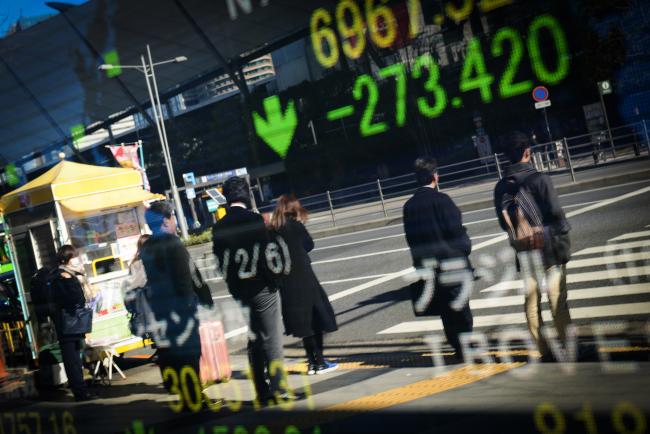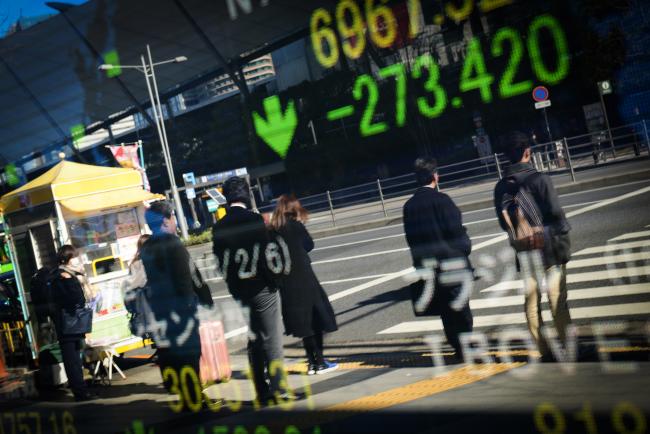(Bloomberg) -- Spare a thought for Tokyo’s bulls. Abandoned, distracted by scandal, and now they’re watching $200 billion wiped from stock values by American trade measures they thought they could avoid.
They were nursing the biggest losses in global markets Friday, down 4.5 percent on the Nikkei 225 Stock Average and 3.6 percent on the Topix Index. Unlike stocks in Hong Kong or the U.S., theirs are now squarely below their worst level of February, down more than 8 percent for the year and in the grip of a strengthening currency.
Nothing new, for anyone who’s traded here.
“Japan is a cyclical equity market," said Yoshinori Shigemi, a global market strategist at JPMorgan Asset Management Japan Ltd. “When risk is off, Japan gets offloaded first."
While Trump’s latest and loudest protectionist blow fell on China, hopes that Japan will be spared from steel and aluminum levies also took a hit Thursday as the country wasn’t on a list of exempted countries given by U.S. Trade Representative Robert Lighthizer in Senate testimony.
Dashing Hopes
The selloff is dashing hopes of those who thought signs of an improving economy would stem losses that have now swelled to almost 15 percent since Jan. 23. Friday’s plunge came the same day a key inflation gauge ticked up, putting the Bank of Japan halfway to its goal of 2 percent.
As is often the case, part of the problem is foreign investors. They’ve yanked nearly $50 billion from futures on the Topix and Nikkei 225 this year. Another 2 trillion yen ($19 billion) has fled cash equities this year through to March 9, according to data from the Tokyo Stock Exchange.
As if that wasn’t enough. The yen has spiraled to a 16-month high against the dollar, always a factor in chasing foreigners out. Apart from being a barometer of risk, strength in the currency erodes corporate profits at export-driven Japan.
Something Wrong
Right now, the broader Topix, whose direction is often dictated by foreign investors who account for roughly a third of the market, is on track for its worst performance since 2011. It’s fallen below its 200-day moving average for the first time in more than a year, a sign that "something wrong" is going on, Hiroshi Matsumoto, head of Japan investment at Pictet Asset Management Ltd., said.
Pictet earlier this year downgraded its global equity outlook to neutral, citing a bearish view for U.S. equities. But it stayed positive on Japan, betting the economy, earnings and low valuations would cushion global influences.
Matsumoto is one of many bulls in the Japanese market who have put their faith in economic fundamentals. He’s been perplexed by everything from Trump’s protectionist rhetoric to Prime Minister Shinzo Abe’s alleged link to a controversial government land sale to a school.
Read more: The Stock Market Where Fundamental Research Goes Out the Window
"I don’t want to overreact. But, I don’t want to underestimate the impact," either, Matsumoto said, referring to the latest development on Trump’s vow to slap China with a $50 billion tariff. "It’s difficult."
Bears Awaken
It’s all starting to dent sentiment for Japan, where bears had previously been hard to find. While overweight the country on average, that will change if political risk rises, a fund manager survey published by Bank of America Merrill Lynch showed. Credit Suisse earlier this month downgraded its outlook on Japanese equities to benchmark, calling the market "most cyclical of the global market."
Matsumoto isn’t giving up.
"Key is in how strong or weak earnings guidances are from companies," he said. "If the management says there’s no need to worry, even if the currency rises to 100 yen per-dollar levels, that they can make profits next year; if we hear such an optimistic outlook, the market can have more confidence."

